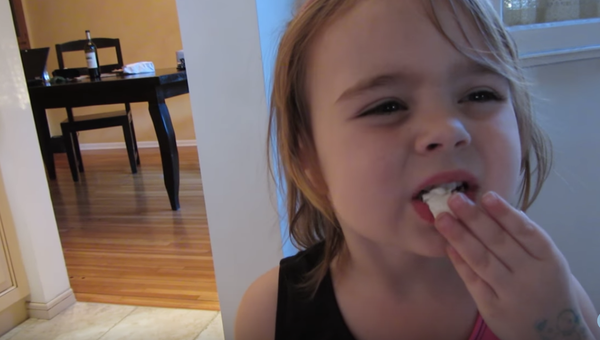My cousin Lillie is one of the most amazing humans I have ever met. I continue to be impressed by her maturity and kind heart. She has so much compassion for all living creatures, and she really loves animals. She is so much fun to be around, always ready to be silly and play. Like with a lot of kids, it is so interesting to take the time to see the world the way she sees it. Along with all these other parts of her Lillie also has a disorder called ARFID (Avoidant/ Restrictive Food Intake Disorder) which is technically classified as an eating disorder although it's important to keep in mind that this condition has nothing to do with her self-image or her perception of her weight. The ARFID was caused by SPD (Sensory Processing Disorder), although that isn't always the case with ARFID patients. ARFID is caused by some sort of food related trauma, usually, something like severe allergies, choking or vomiting. In Lillie's case, it was her negative feelings towards food caused by her SPD that lead to her developing ARFID. Typical symptoms of ARFID are a lack of interest in food or poor appetite, fears of negative consequences from eating (allergic reactions, choking, and vomiting), and picky eating. All of these symptoms can lead to weight loss, failure to grow as expected, nutritional deficiencies, dependence on supplements or feeding tubes and impairment in psychosocial functioning. ARFID is more common in children and young adolescents than it is in adults. I'm sure you can imagine how terrifying it would be to be the parent of a child with ARFID, trying everything to make sure your kid is getting all the nutrients they need to thrive when they are struggling with eating or how scary it would be to be a child unable to eat certain things and articulate why to their caretakers. Sixty-three percent of pediatricians are unaware of the diagnosis of ARFID and there are very few facilities equipped to deal with situations similar to Lillie's. Because this disorder isn't very well known, it leaves the affected struggling for answers and treatment options. To help raise awareness I wanted to share Lillie's journey with ARFID both for her benefit and the benefit of others impacted by this disorder.
When Lillie was first being introduced to solid foods, like rice cereal, she would cry, spit, gag and sometimes vomit to remove the food from her mouth. When a pediatrician was consulted, her parents (my amazing Aunt Mellissa and Uncle Jonathon) were told to try adding a little bit of pureed fruit to the mixture. Lillie eventually accepted this but it was only the beginning of her food struggles. As her parent's continued to try to introduce new foods ad she got older similar patterns occurred although she did continue to drink formula and eat some snacks (like crackers or french fries, nothing that would really give her the nutrition she was needing). At eighteen months Lillie was referred out to her first specialist, a nutritionist, and dietician, who essentially recommended vitamins and fortified milk to her get the nutrients she needed in combination with "helping her to get hungry enough to eat". This meant that if they introduced new foods and Lillie wouldn't eat them, she would just go without food, hoping the hunger would encourage her to try food and everything would just click. This was incredibly hard for her parents and it was clear very quickly that method wouldn't work very well for her. They found another program that had had success with similar cases but at five years old she was discharged having "met maximum improvement". Knowing their kid had been under a lot of pressure, her parents decided to give Lillie a break hoping that starting kindergarten and being around other kids would encourage new eating habits, although this did not end up being the case. They continued to experiment with different types of therapies and treatments, both conventional and unconventional but nothing seemed to really work.
At ten years old Lillie was eating less than ever before and her parents knew something had to be done. They looked into various treatment facilities and heard back from most of them that they wouldn't be the correct fit for her needs. They finally found the STAR institute in Denver and organized a trip. Insurance coverage and travel expenses were a whole separate set of challenges but Lillie visited the institute for a week of extended evaluation to determine what exactly she was dealing with and what would work for her. When they received the report back it was clear that Lillie had more sensory issues than they initially realized and she needs to learn healthy ways to come with them. She will be returning to the institute for further feeding and occupational therapy. I am thrilled to say Lillie now seems to be much happier, to have more energy and more confidence. Clearly, the therapy had a positive effect on her and I hope things will only continue to improve. I'm sure it must have been so hard for Lillie to struggle with both ARID and SPD and not have anyone who understood exactly how she felt. It's important to raise awareness about these disorders so that people affected will have options and places to turn for help.
If you are interested in further information on Lillie's story or would like to help, you can go here. For further information on the STAR institute, you can go here. My thoughts and prayers are with anyone affected by ARFID or SPD, themselves or their children.





















